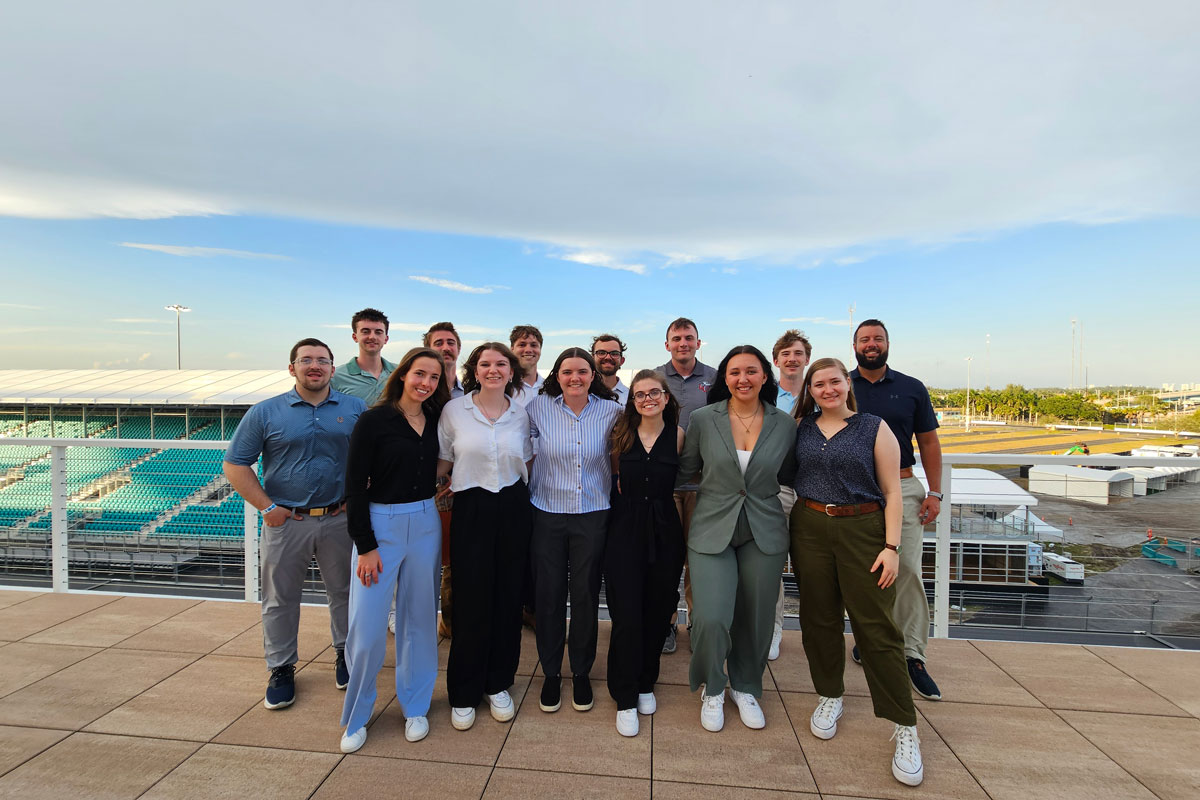Search News Archives
Filter News Articles
Additional Navigation
Speaker rallies for resilience at Liberty’s annual Mental Health Summit
April 3, 2025 : By Ryan Klinker - Office of Communications & Public Engagement
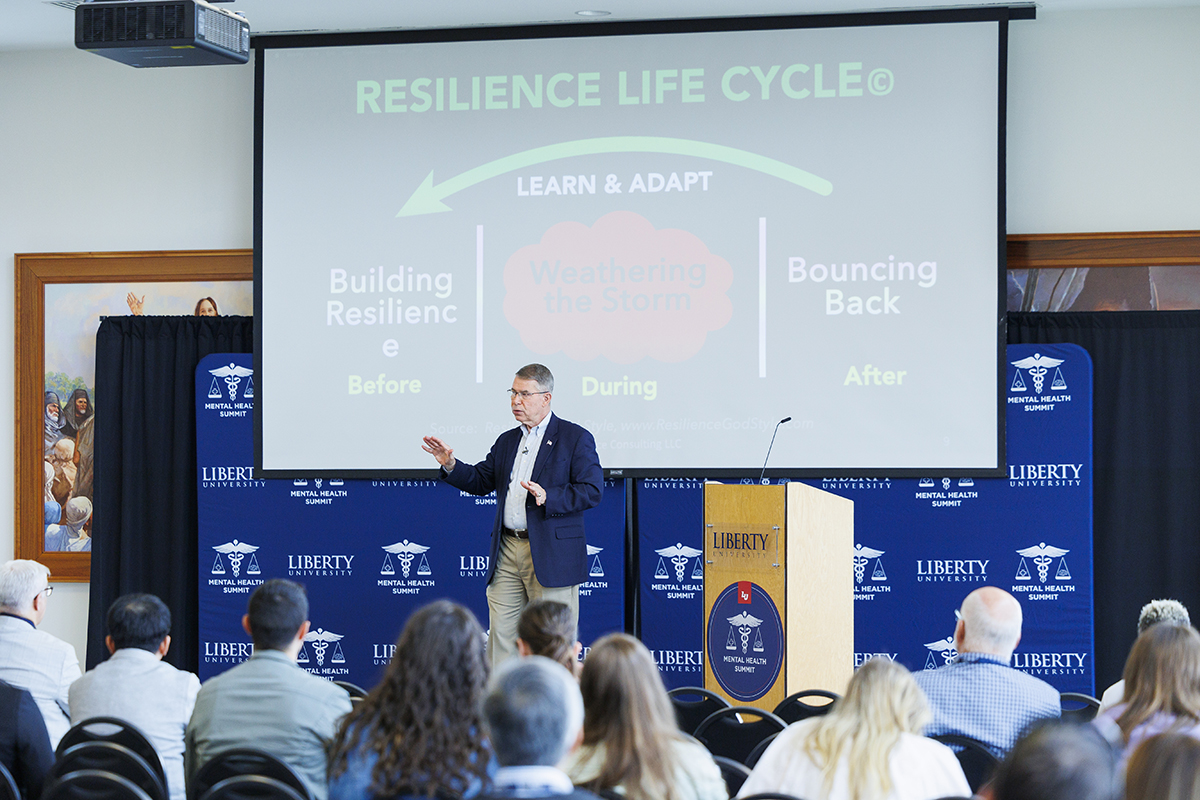
Students, faculty, and local professionals gathered on the Liberty University campus over the weekend for the School of Behavioral Sciences’ second annual Mental Health Summit, which aimed to equip and encourage attendees with a broadened awareness of various mental health-related topics.
The summit kicked off on Friday with a networking event for participants to learn more about the upcoming presenters and local organizations. Saturday’s events featured a keynote address from Army Maj. Gen. (Ret.) Bob Dees, founder of the National Center for Healthy Veterans, and several breakout sessions.
After serving 31 years in the U.S. Army, Dees has continued to make a difference in his retirement. In 2019, he founded the National Center for Healthy Veterans, a faith-based, multi-faceted reentry program in Altavista, Va., less than 20 miles from campus, for struggling veterans and their families. He is the author of “The Resilience Trilogy (Resilient Warriors, Resilient Leaders, and Resilient Nations).” Dees is no stranger to Liberty. He has served the university as associate vice president for military outreach and founded its Institute for Military Resilience, a faith-driven program that provides education to service members, their families, pastors, and caregivers on the various challenges linked to the invisible scars of war. In 2024, Liberty presented Dees with George Rogers Champion of Freedom Award.
On Saturday, Dees was introduced by Dr. Steven Keith, director of Liberty’s Center for Chaplaincy, who spoke to Dees’ extensive career of service to his country and the men and women who have defended it.
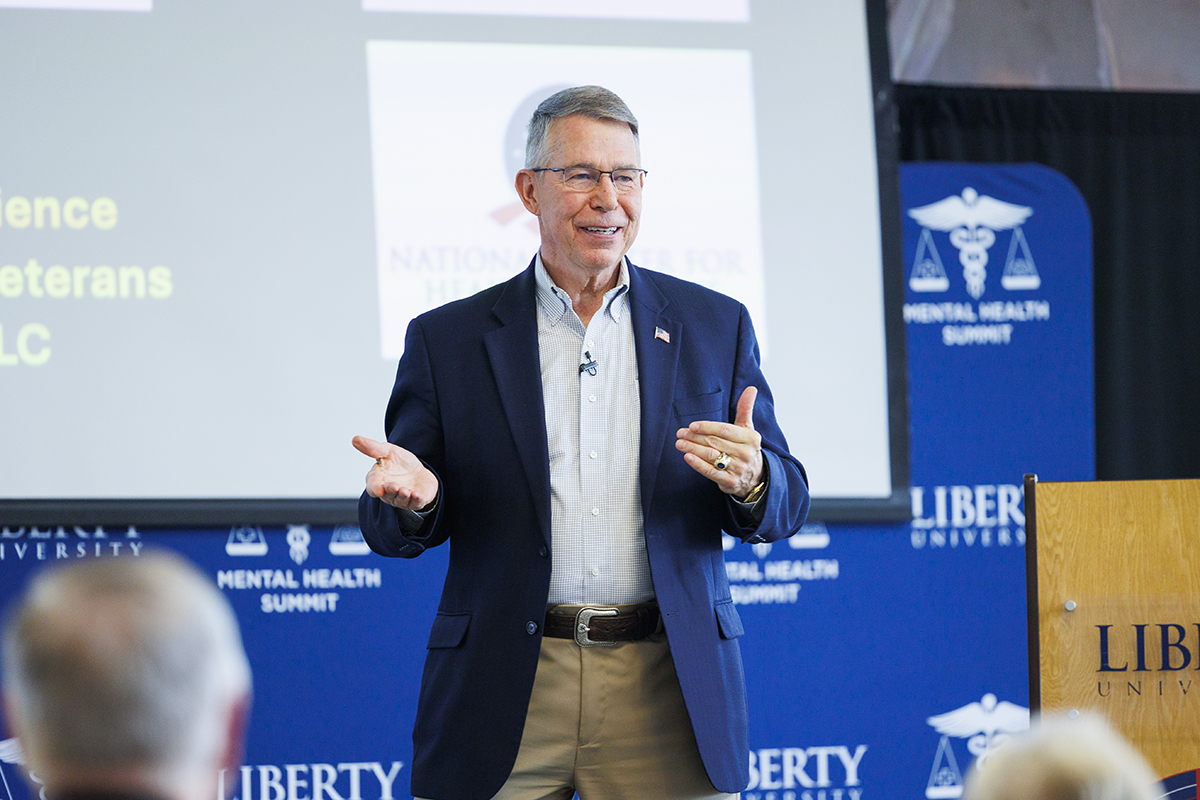
“I like to say he was on mission with the military for 31 years, but he’s been on mission for Jesus Christ his entire life,” Keith said. “I’m thrilled to say that Gen. Bob Dees understands that the Living Water, Jesus Christ, is the one who wants to be in the middle of our lives as we seek to help people with their mental health and emotional challenges.”
As a military leader (his roles included Assistant Division Commander of the 101st Airborne Division, Commander of the 2nd Infantry Division in U.S. Forces Korea, and Commander of the U.S.-Israeli Combined Task Force for Missile Defense), Dees said he learned a mantra that was figuratively tattooed onto his head: accomplish the mission and take care of the troops. Soon after, he said it became more than a directive, as he felt a stirring to make that mantra his life’s mission.
“Somewhere in that experience, that tattoo went to my heart,” he said “I saw (service members) in our military who are so selfless, so sacrificial, the ones who are often the least prepared and most wounded. In that experience, it goes from your head to your heart, into your gut, and it becomes your life’s calling. You have your own calling, you’re not here by accident, and God has called you with a real purpose to care and be caregivers. I honor you for that, everyone from all of the different schools here, for (following that purpose).”
In order to pursue and complete this calling, Dees said it will take resilience amid the storms of life and faith in the Lord.
“What does resilience look like? We are often troubled, but not crushed; in doubt, but not in despair; facing many enemies, but not without a friend; badly hurt, but not destroyed,” Dees said, paraphrasing 2 Corinthians 4:8-10. “This whole notion of resilience is understanding the challenges of life and yet recognizing that we have the resources and means not to become an egg instead of a tennis ball.”
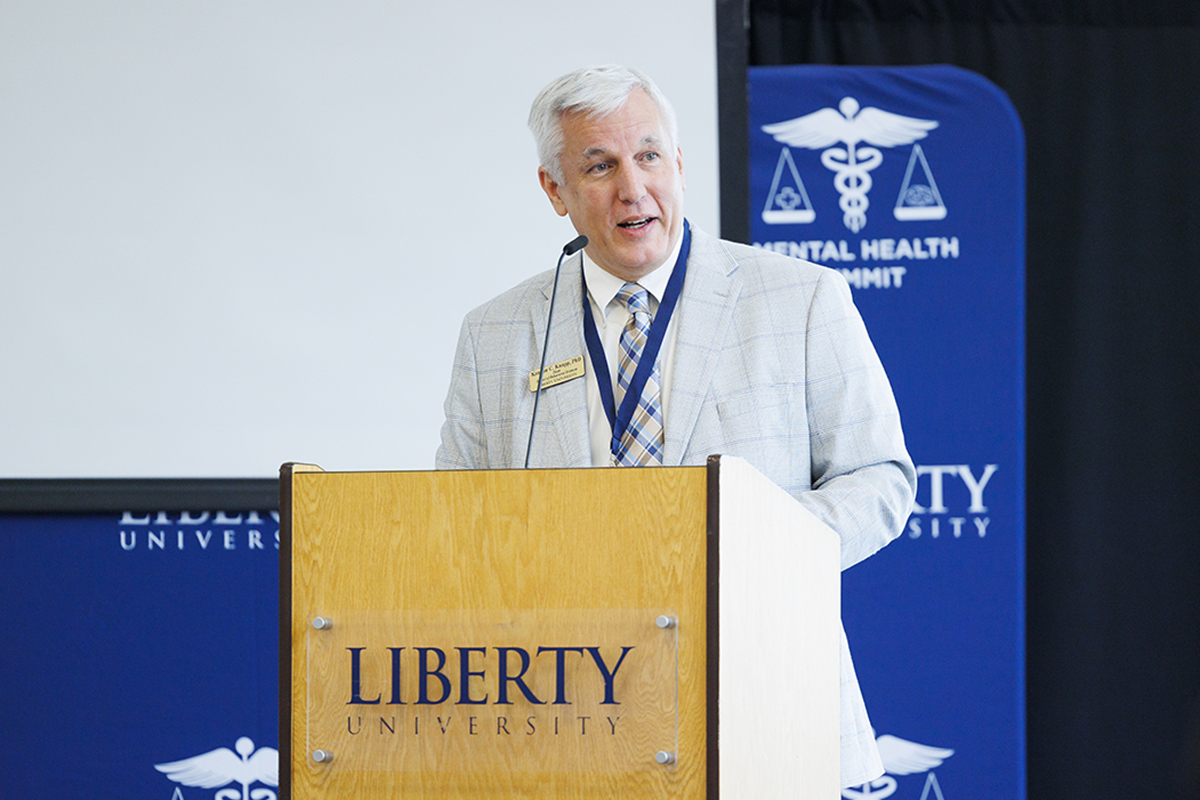
He cited John 16:33 — “In the world you will have tribulation, but take heart, I have overcome the world” — in saying that resilience includes a foundation of faith in God to rely on in the hard times. Dees told the story of Chaplain Robert Preston Taylor, a prisoner of war in World War II who survived the Bataan Death March and long periods of time in a “hell box” designed to break down his body and spirit. When Taylor was asked by his fellow prisoners how he was enduring, he said, “Don’t doubt in the dark what you believed in the light.”
“Let’s figure out what we believe … so that in the dark of doubt, despair, woundedness, depression, or whatever else that dark is, we are able to remember and return back to our ‘why’ and what we determine to be real and true in our lives,” Dees said.
He shared the purpose of the National Center for Healthy Veterans and its Valor Farm facility, what he called “a living laboratory for veteran mental and behavioral health” where veterans are offered housing, life and career programming, and the opportunity to receive equine therapy from horses that help in ways that no human can.
Speaking to the present and future mental health professionals, Dees said their resilience and pursuit of helping others ought to be led by God.
“What you’re doing is great; great in the eyes of the Lord and great in the eyes of man,” he said. “You care and you are caregivers. Prayerfully as you leave here, you’ll have even more motivation to excel in your craft, to excel in your passion, and excel in your walk with Jesus Christ, who will fuel your efforts from this day forward.”
Breakout sessions followed throughout the afternoon, presented by representatives from the Liberty University College of Osteopathic Medicine, School of Behavioral Sciences, School of Health Sciences, School of Nursing, or School of Business. Conversations included Autism Spectrum Disorder diagnosis and treatment, postpartum depression, nutritional psychiatry, clinically integrating a biblical worldview, mental and relational well-being in the workplace, and the efficacy of digital mental health smartphone applications.
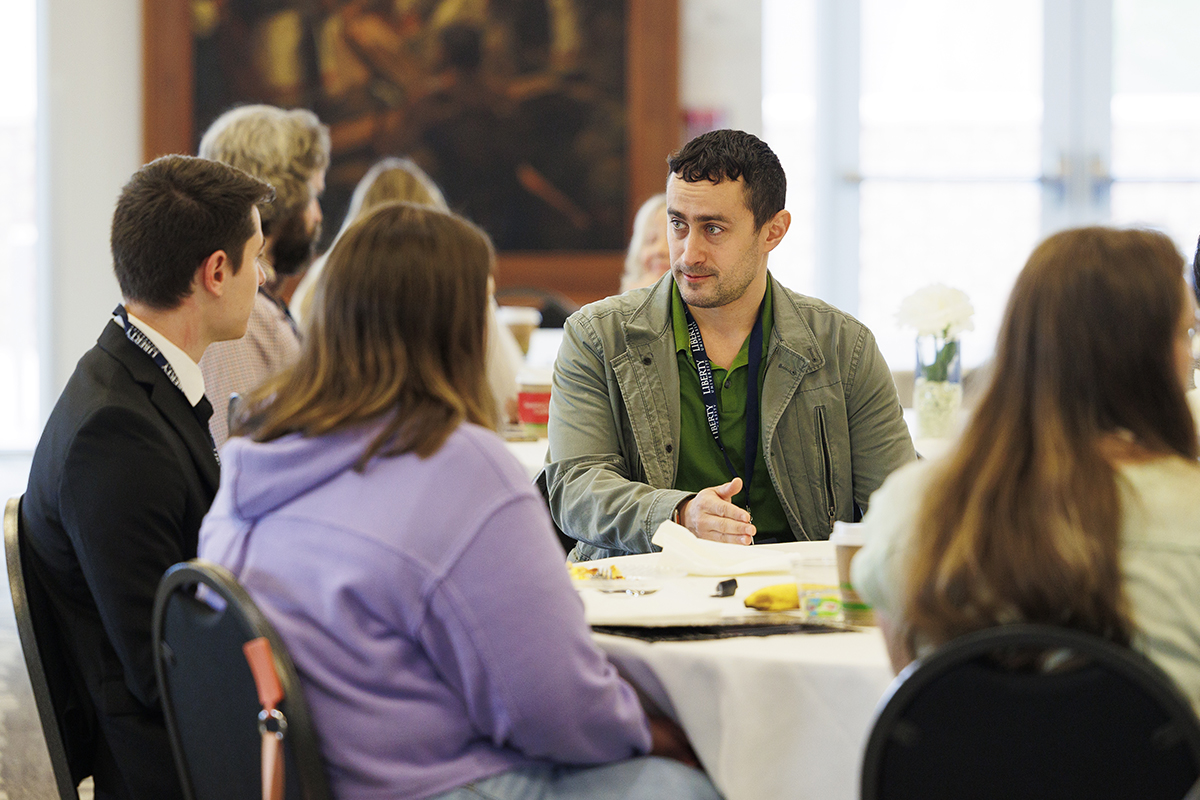
“We are so grateful for the interdisciplinary collaboration at the Mental Health Summit, as the School of Health Sciences, School of Business, School of Nursing, and the College of Osteopathic Medicine all co-sponsored the event with us,” School of Behavioral Sciences dean Dr. Kenyon Knapp said. “We had increased attendance this year with 1,106 people participating. We also appreciated the stirring keynote address from Maj. Gen. Bob Dees, who always inspires us to be ambitious in mental health related ministry work.”
As a junior studying psychology who has been fascinated by the field of mental health for years, Kayleigh Rutledge said she appreciated the opportunity to attend the breakouts and hear from experts.
“These are things I’ve been interested in for a long time, and so it’s a perfect opportunity and environment to get further into it and hear (the presenters) share,” Rutledge said. “We get to hear from people and ask them questions throughout, and it’s exciting to learn more.”
Some students also helped present during breakouts, such as senior biomedical sciences (pre-med) student Camrey Yeager and junior zoology (pre-vet) student Sarah Nelson, who both have minors in psychology. The duo has worked with Assistant Professor of Biology Dr. Kayla Gilley-Connor on research regarding the cognitive and emotional impacts of diabetes.
“We’ve had multiple opportunities to present our research before, but we saw this as another great opportunity to share our work, and this time it can be more in-depth as a part of (breakout sessions),” Yeager said.
Multiple breakouts qualified attendees to earn Continuing Medical Education (CME) and/or Continuing Education Unit (CUE) credits.


